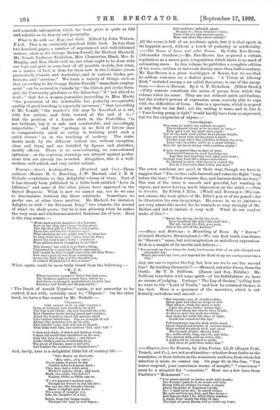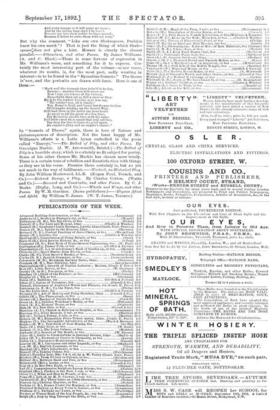POETRY.—Love's Looking - Glass. (Percival and Co.)—Three authors—Messrs. H. C. Beeching, J.
W. Mackail, and J. B. B. Nichols—contribute to this delightful volume of verse. Part of it has already been published in a little book entitled "Love in Idleness," and some of the other pieces have appeared in the Oxford Magazine. What is new we cannot say, nor do we care to discriminate between the three minstrels. Sometimes we prefer one, at other times another. Mr. Mackail, for instance, delights us with "An Etruscan Ring," two sonnets, the second of which we shall quote ; but he is less pleasing when he makes the very sane and wholesome-minded Nausicaa die of love. Here is the ring sonnet :— "What dark-haired daughter of a Lucumo Bore on her slim white finger to the grave This the first gift her Tyrrhene lover gave, Those five-and-twenty centuries ago ? What shadowy dreams might hauot it, lying low So long, while kings and ai mies, wave on wave, Above the rook-tomb's burie I i,rchitrave Went million-footed trampling to and fro ?
Who knows? but well it is so frail a thing, Unharmed by conquering Time's supremacy, Still should be fair, though scarce less old than Rome. Now once again at rest from wandering Across the high Alps and the dreadful sea, In utmost England let it find a home."
What, again, could be more truly Greek than the following :—
" W. Y. S.
1890.
Where nineteen summers' festal feet had gone, The darkness gathers round thee, laid alone ; And there, unchanged, unshadowed, lie with thee Kindness and Truth and Magnanimity."
The Death of Arnold Toynbee," again, is not unworthy to be ranked, if not with, certainly near to, " Thyrsis." On the other hand, we have a fine sonnet by Mr. Nichols :—
" CALIGULA.
(THE BASALT BUST AT THE CAPITOL.) Being in torment, how should he be still? The slim neck twists; the eyes beneath the wide Bent Claudian brows shrink proud and terrified ; Along the beardless cheek the muscles thrill Like smitten lutestrings. Can no strength dl will Silence this presence ever at his side. This hateful voice, that will not be denied.
That talks with him, and mutters 'kill,' and kill ' ?
0 dust and shade, 0 dazed and fighting brain, 0 dead old world that shuddered on his nod, Only this iron stone endures ; and thence Looks forth a soul in everlasting pain, The ghost of Caesar, maniac and god, And loathes the weakness of omnipotence."
And, lastly, here is a delightful little bit of country life :—
"Tea ROBIN TB SANITARY. 'Hoy robin, jolly robin.' Green again, 0 green to-day Garden lawn and mossy park ; They have laid a while away
Winter's ermine cloak ; and hark, Hark, our robin, who but he ? Singing blithe as blithe can be.
'T's not passion's melting note, Though his breast be red like fire ; Nor can his, like thrush's throat,
Raise to rapture each desire : 'Tis a song of simplest joy, Lae the laughter of a boy.
Robin keep thy happy heart,
Through the year so well begun :
Live and love, unheard, apart. So may we, when Summer's done, Tired with al t and passion-spent, Hear and share thy sweet content."
All the verse is full of an academic spirit, but it is that spirit in its happiest mood, without a touch of pedantry or artificiality. —The Dawn of Love, and other Poems. By Colin Rae-Brown. (Alexander Gardner.)—Mr. Rae-Brown has acquired a certain reputation as a minor poet, a reputation which there is no need of estimating anew. In this volume he publishes a complete edition of his verse, written at intervals during more than half-a-century. Mr. Rae-Brown is a great worshipper of Burns, but We see that he seldom ventures on a dialect poem. "A Vision at .A.11oway Kirk," included among a set called Burasiana, is one of the excep- tions.—Love in Earnest. By 3". G. F. Nicholson. (Elliot Stock.) —Fifty sonnets constitute the series of poems from which the volume takes its name. They are not without spirit and feeling, but the writer's powers of expression seem scarcely able to cope with the difficulties of form. Here is a specimen, which is as good as any that we can find ; yet the ending is tame, and in line 5, "Your loving grasp is tight," would hardly have been so expressed, but for the exigencies of rhyme :—
"LOVE-DREAMS, You come to soothe my solitude to-night,
Thrice-blessed vision, user invoked in vain,—
Your spell is on my spirit once again : Out of the dark your golden head gleams bright, Upon my hand your loving grasp is tight, Flashes your smile like sunshine through the rain, Your voice breathes softly as a sweet refrain ; You stir my heart-strings with resistless might !
0 love, we parted thus in days of yore, Unwonted dimness in your laughing eye, And that last lingering look upon your brow; Though your fond litt'e fingers nevermore Be clasped in mine, that memory cannot die, For as I loved you then I love you now!"
The seven rondeaus are good in their way, though we have to suggest that "The cuckoo calls farewell and takes his flight "long before the time " When summer dies, and harvest-fields are bare." The rest of the verse is smooth and graceful, but wanting in vigour, and never leaving much impression on the mind.—Fate in Arcadia. By Elwin j. Ellis. (Ward and Downey.)—We can- not admire the work either of Mr. Ellis's pan or of his pencil—for he illustrates his own imaginings. He seems to us to imitate a not very admirable model, for he reminds As very strongly of Mr. Barlow, and not to imitate it very well. What do our readers make of this ?— " Desire the string, deride the weak,
Love laughing lips while life shall last ; For all, except the End, goes past, This is the Art of the Antique."
—Blurs and Blottings a Miscellany of Verse. By " Daven." (Cornish Brothers, Birmingham.)—We can find truth sometimes in "Daven's " muse, but not imagination or melodious expression. Here is a sample of its merits and defects :—
" For around me there hung the dank, burdensome folds of an ache charged and rheumatic fog,
Which shrouded my view, and impeded the flight of my far-s3aring mind like a clog."
Any one can recognise the fog, but how are we to see the second line By reading rheumnic P—Btanaid, and other Poems, from the Gaelic. By T. D. Sullivan. (Eason and Son, Dublin.) Mr. Sullivan translates with some spirit—of his faithfulness we have no means of judging. Perhaps "The Lay of Ossian," telling how he went to the "Land of Youth," and how he returned thence, is the best. Here is a specimen of the narrative, which is suf- ficiently melodious and smooth :—
"Her winsome eyes, of cloudless blue, Shone pure and clear as drops of dew That glisten, while tha morn LS new,
Upon the grass blades' dainty tips ; With rosy bloom her cheeks were bright, As driven snow her neck was white,- And shone her teeth like lines of light, Inside her rounded ruby lips.
Full beauteous was her milk-white steed,
Sweet-shaped and bright, of choicest breed ; High-arched his glossy neck, and speed Was in each slender shining limb; His saddle-cloth, long, smooth, and wide, Was starred with gold on either side, A golden bit he champed in pride,
And shoes Of gold were under him."
—Rhymes front the Russian, by John Potter, LL.D. (Kegan Paul, Trench, and Co.), are not so attractive—whether from faults in the translator, or from defects in the numerous authors, from whom his selection is made, we cannot say. On page 40, in the line, "You scarce respond; your conscience seems of naught," "conscience" must be a misprint for "conscious." Here are a few lines from Pushkin's "Monument" :— "I've raised myself no statue made with hands; The People's path to it no weeds will hide. Rising with no submis-ive head, it stands Above the pillar of Napoleon's pride. No ! I shall never die ; in sacred strains My soul survives my dust, and files decay— And famous shall I be, while there remains A single Poet 'neath the light of day. Through all great Russia will go forth my fame, And every tongue in it will name mv name ; And by the nation long shall I be loved, Because my lyre their nobler feelings moved ; Because I strove to serve them with my song."
But why the comment, "Like our own Shakespeare, Pushkin knew his own merit " ? That is just the thing of which Shake- speare:does not give a hint. Horace is clearly the closest paralle1.—Ethandune, and other Poems. By James Williams. (A. and C. Black).—There is some fervour of expression in Mr. Williams's verse, and something for it to express. Cer- tainly the mcst interesting part of the volume--minor verse, whatever its merits, is, for the most part, sadly wanting in interest—is to be found in the "Byzantine Sonnets." The theme is-new, and the portxaits are drawn with force. Here is one of them :—
"Mark well the triumph thou behed'st to-day, Byzance ; another thou wilt never see Now lingo are tokens of thy victory, Henceforth thou art as full a slave as they.
k to the captive Vandal, hear him say,
''Tis vanity—yea, all is vanity Yea. Rome is dead, and leaves but dreams to thee Of triumphs winding up the Sacred Way.
Still bast thou in thy midst one hero heart As great as all the great of o'den time,
For Belisarins shields thee with his name.
Full little canst thou sound that soul sub'ime,
Too deep for thee it bears its grief apart. An empire's glory and an empire's shame."
In "Sonnets of Places," again, there is love of Nature and -picturesqueness of description. Not the least happy of Mr. Williams's efforts is a Latin hymn embodied in the poem called "Emreys."—The Ballad of Pity, and other Poems. By Gascoigne Mackie. (J. W. Arrowsmith, Bristol.)—The Ballad of Pity is a horrible story, which is certainly no fit subject for poetry. Some of his other themes Mr. Mackie has chosen more wisely. There is a certain tone of rebellion and dissatisfaction with things as they are in his verse. Promise there certainly is, but as yet not much in the way of fulfilment.— Warbeck, an Historical Play. By John William Hazlewood, LL.B. (Kegan Paul, Trench, and Co.) —Richard Swinge, a Play. By Charles Cotton. (Watts and Co.)—Bernard and Constantia, and other Poems. By C. J. Beake. (Digby, Long, and Co.)—Wheels and Wings, and other Poems. By W. M. Gardner. (Same publishers.)—Rhymes Afloat and Afield. By William T. James. (W. T. James, Toronto.)



































 Previous page
Previous page